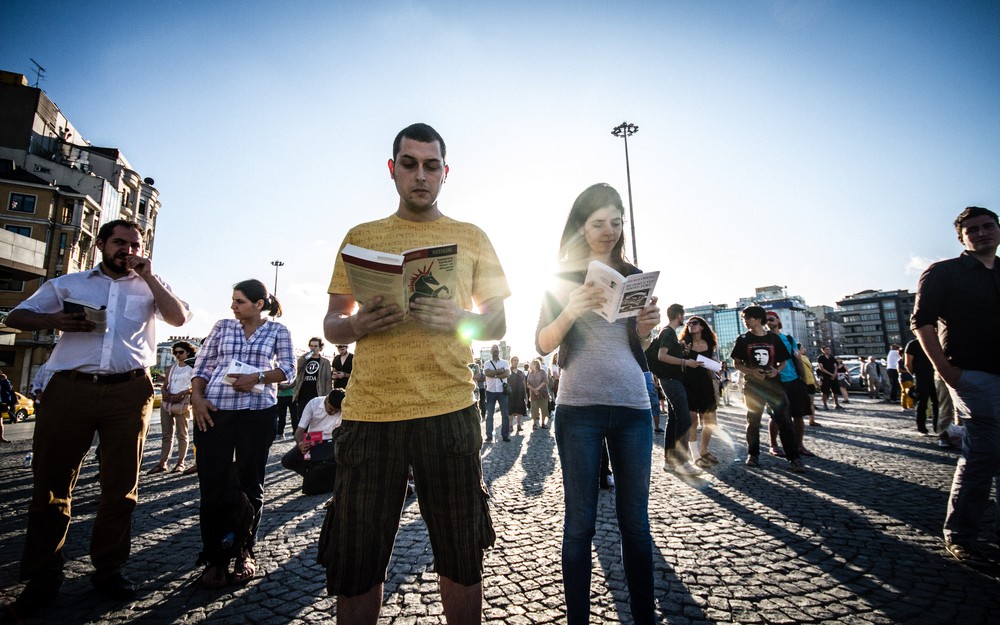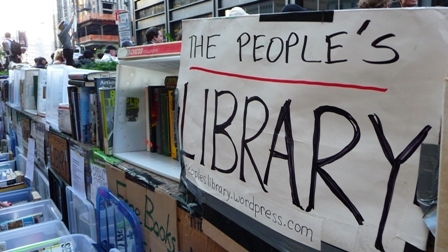Occupation libraries are temporarily built street libraries during protest activities. Protestors or the general public can stop at the library in the street to read as a way to show their support to these events. Some of the first occupation libraries were built during the Fall 2011 Occupy Wall Street protests in New York[i] This practice has been adopted by protestors in Turkey.
Occupy library in New York street [ii]
The protest in Turkey started in Gezi Park on May 28, 2013. It was triggered by the government selling out the Taksim Gezi Park, Istabul’s last public space, to real estate developers for commercial use. This protest later turned into a large scale civil rights event to pursue freedom of expression and other civil rights.[iii] The occupation library was initially built in the park with a box of abandoned books. Later more than 10 Turkish publishers donated books to the library to support their protest. These donated books cover a variety of topics, including political issues, religions, history, philosophy, etc. Some popular readers’ picks on the shelves cover: The Myth of Sisyphus by Albert Carnus, Leaf Storm by Vabriel Garcia Marquez, Old Garden- Old Love by Tezer Ozlu, When Nietzsche Wept by Irvin David, and Resurrection Gallipoli 1915 by Turgut Ozakman.[iv] People are invited to read at the protest site, preferably in front of police officers to support this activity.[v]
Both makeshift libraries share some common features. First, all books in occupation libraries are donated by individuals or institutions. They are open for the public use. Second, because of their special nature, these libraries operate under strict government rules. This causes challenges to preserving books. Some of the first group books in the People’s library in Occupy Wall Street campaign were flooded in a rain because the police did not allow librarians to cover them.
People are reading at the Occupy library in Istanbul[vi]
Occupation libraries extend libraries’ missions in social life from circulating materials and sharing information to expressing people’s attitudes. Occupation libraries also mark a new development of civil rights activities. Despite protesters’ dissatisfaction with the government, these libraries avoided violent confrontations in the protests. Instead, they invite people to stop and read at the library as a way to say they care and support the activities. No matter which side these libraries stand with, they should be respected for expressing the public’s opinions on social issues and discussing disputes in an open and peaceful way.
[i] Christian Zabriskie (2013). A Library Occupies the Heart of Occupy Movement. http://www.americanlibrariesmagazine.org/article/library-occupies-heart-occupy-movement.
[ii] Archive Occupy Wall Street. http://www.philnel.com/category/occupy-wall-street/.
[iii] Wikipedia: 2013 Protest in Turkey. https://en.wikipedia.org/wiki/2013_protests_in_Turkey.
[iv] George Henton (2013). In Pictures: The Taksim Square Book Club: Protesters stand silently and read books in central Istanbul, in stark contrast with scenes of violence. http://www.aljazeera.com/indepth/inpictures/2013/06/2013624105477515.html.
[v] Ariel Bogle (2013). Turkish publishing houses unite in Gezi Park to distribute books. http://www.mhpbooks.com/turkish-publishing-houses-unite-in-gezi-park-to-distribute-books/
[vi] In Pictures: The Taksim Square Book Club. http://www.aljazeera.com/indepth/inpictures/2013/06/2013624105477515.html.


